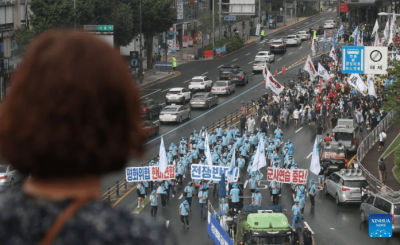Protests Threaten Biden Administration’s Plans for a New Golden Era in U.S.-South Korean Relations

All Global Research articles can be read in 51 languages by activating the “Translate Website” drop down menu on the top banner of our home page (Desktop version).
To receive Global Research’s Daily Newsletter (selected articles), click here.
Follow us on Instagram and Twitter and subscribe to our Telegram Channel. Feel free to repost and share widely Global Research articles.
***
During his trip to the Indo-Pacific in May, U.S. President Joe Biden made his first stop in South Korea where he hoped to inaugurate a new golden era of U.S.-South Korean relations.
South Korea’s newly elected President Yoon Suk-yeol was a conservative who had promised a tough stance against North Korea. A RAND Corporation analyst heralded him as “Biden’s perfect South Korean partner.”
The U.S. has maintained tens of thousands of soldiers in South Korea since the Korean War ended in 1953 with an armistice, not a peace treaty, and established 15 military bases there.
During their meeting, Biden and Yoon agreed to “expand the scope and scale” of combined military exercises and training, and discussed the possibility of deploying strategic military assets, “fighters, bombers, or missiles,” to South Korea to bolster its deterrence capabilities against North Korea, which had been ruled for the last 75 years by the socialist Kim dynasty.
Neither Biden nor Yoon, however, factored into their plans the large-scale protests which broke out on August 13 in Seoul in reaction to the military exercises, and others that may yet follow.
Named “Ulchi Freedom Shield” after a seventh Century Korean General, the military exercise have involved thousands of troops in live-fire exercises combining land, sea and air forces, and joint mock attacks assisted by drone surveillance.
North Korean leader Kim Jong-un denounced these drills as a “dress rehearsal for northward invasion,” while a columnist for a North Korean newspaper wrote: “how could anybody only see a terribly dangerous tumult [since the U.S. and South Korea were] playing with fire at the front door of [North Korea’s] home.”
The drills coincided with rising tensions with China resulting from Nancy Pelosi’s inflammatory visit to Taiwan and the Biden administration’s sending of warships into the Taiwan Strait in violation of international law. Yoon had inflamed China through his decision to add more anti-missile batteries employing the U.S. Terminal High-Altitude Area Defense system, or THAAD, which could be reconfigured to peer into Chinese territory.[1]
Yoon has also committed South Korea to a closer security relationship with Japan, with Japanese naval units joining the U.S. and South Korea for missile search and tracking exercises off the coast of Hawaii.

Protests in Seoul against THAAD missiles. [Source: defensenews.com]
Yoon’s predecessor, Moon Jae-in (2017-2022), had tried to repair relations with Beijing by pledging the “Three Nos”—that Seoul would not deploy any additional THAAD systems; would not participate in U.S.-led missile defense networks; and would not form a trilateral military alliance with Washington and Tokyo.
During Donald Trump’s presidency, regular U.S.-South Korea drills were suspended. Trump and Moon held talks with North Korean leader Kim Jong-un and drew down military cooperation as a sign of goodwill toward Pyongyang.
In a sign of today’s worsening relations, North Korea responded to the “Ulchi Freedom Shield” drills by launching two cruise missiles into the Sea of Japan.
“No War Rehearsal”
The August 13 protests in Seoul were timed to coincide with National Liberation Day, celebrating the 77th anniversary of the Korean Peninsula’s liberation from Imperial Japan’s 1910-45 colonial rule.
Participants took to the streets and chanted anti-U.S. slogans, shouting “Dissolve [South] Korea-U.S. alliance” and “This land is not a U.S. war base.”

Protest in Seoul. [Source: english.almayadeen.com]
Placards at the rally read “No war rehearsal, No U.S.” and “No [South] Korea-U.S.-Japan military cooperation.”
Yang Kyung-soo, chief of the Korean Confederation of Trade Unions (KCTU), said at the protest rally that staging military exercises in preparation for a war is “tantamount to intending to wage a war,” according to local newspaper Chosun Ilbo.
That newspaper reported that some of the KCTU members had carried out anti-U.S. demonstrations earlier in the month near U.S. military bases across South Korea, demanding the withdrawal of U.S. troops from the country.
In late June, civic groups carried out civil disobedience in front of the Jeju-do island Naval Base demanding a halt to maritime war drills and closure of the base—which was built on a pristine World Heritage Site.
Jeju-do island was the site of a horrific series of massacres by U.S. and South Korean troops on the eve of the Korean War.

Source: researchgate.net
Peace activist Choi Sung-hee wrote that the protests in Jeju-do in late June were more than just opposition to a particular military exercise; they were part of a “struggle against the preparations for war in Northeast Asia and the wholesale militarization of the ocean, earth, sky, and space.”
This is equally true of the August 13 protests, which might initiate a tidal wave that sets back Biden and Yoon’s militarist designs.
*
Note to readers: Please click the share buttons above or below. Follow us on Instagram and Twitter and subscribe to our Telegram Channel. Feel free to repost and share widely Global Research articles.
Jeremy Kuzmarov is Managing Editor of CovertAction Magazine. He is the author of four books on U.S. foreign policy, including Obama’s Unending Wars (Clarity Press, 2019) and The Russians Are Coming, Again, with John Marciano (Monthly Review Press, 2018). He can be reached at: [email protected].
Note
-
Beijing retaliated by suspending Chinese group tours to South Korea and obliterating the China business of South Korean supermarket giant Lotte, which had provided land for the missile system.
Featured image: People rally against the planned South Korea-U.S. military drills in Seoul, South Korea, August 13, 2022. [Source: eng.chinamil.com]

